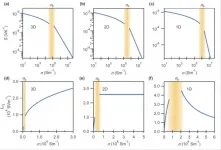The results, presented today at the virtual American Association for Cancer Research (AACR) Annual Meeting 2021, showcase the researchers' ongoing efforts to advance clinical studies and expand potential indications of approved drugs to develop a platform for more effective treatments and to improve patient outcomes.
FDA-approved selpercatinib shows clinical benefits for RET fusion-positive cancers beyond lung and thyroid cancers (Abstract CT011)
Clinical trial results of RET kinase inhibitor selpercatinib show that the targeted therapy was effective in preventing or inhibiting the growth of tumors in RET fusion-positive cancers other than lung and thyroid cancers. The results, derived from a cohort of patients enrolled in the phase 1/2 LIBRETTO-001 trial, were presented by Vivek Subbiah, M.D., associate professor of Investigational Cancer Therapeutics.
Selpercatinib became the first treatment approved by the Food and Drug Administration (FDA) to treat RET fusion-positive lung and thyroid cancers, as well as RET-mutant medullary thyroid cancer (MTC), in May 2020. However, because RET alterations also have been shown to be oncogenic drivers in the pathogenesis of other cancers, it was postulated that selpercatinib could be used to treat other advanced solid tumors in which RET alterations occur.
"Selpercatinib demonstrates promising activity across a variety of non-lung and non-thyroid RET fusion-positive advanced solid tumors, including treatment-refractory GI malignancies," Subbiah said. "Although RET fusions are rare, this undoubtedly has conferred clinical benefit and the gift of time to these patients."
Thirty-two patients with RET fusion-positive non-lung or non-thyroid cancers participated in the study, representing 12 unique tumor types -- including pancreatic, colon, breast, salivary, sarcoma and pulmonary carcinosarcoma. Twenty-nine of the patients were previously treated with systemic therapy.
The objective response rate in this heavily pretreated patient population was 47%, including complete responses observed in two patients. Responses were observed across nine unique cancer types and a spectrum of fusion partners. Responses were ongoing in 73% of the patients, and the median duration of response was not reached at a follow-up of 13 months. The safety profile of this cohort is consistent with the known profile of selpercatinib in the overall LIBRETTO-001 population.
The LIBRETTO-001 trial, which spans 16 countries and 89 sites, continues to enroll patients with RET-altered non-lung cancer.
"These are definitely impactful data for precision oncology from the clinical and translational perspective," Subbiah emphasized. "These analyses reiterate the importance of broad-based genomic profiling to identify actionable oncogenic drivers, including RET fusions."
This research was supported by Eli Lilly and Company. A full list of collaborating authors and their disclosures can be found with the abstract.
Combining dabrafenib and trametinib to treat BRAF V600E-mutant high-grade (HGG) and low-grade glioma (LGG) shows significant antitumor activity (Abstract CT025)
In a nonrandomized, open-label phase 2 study, MD Anderson researchers showed that the combination of BRAF inhibitor dabrafenib and MEK inhibitor trametinib had promising efficacy in patients with BRAF V600 mutation-positive HGG and LGG.
BRAF mutations occur in approximately 3% of glioblastomas and 15% of low-grade gliomas.
The FDA approved a combination therapy of BRAF inhibitor dabrafenib and MEK inhibitor trametinib, which blocks proteins that facilitate cancer cell growth, to treat patients with BRAF V600-positive melanoma, non-small cell lung carcinoma and anaplastic thyroid cancer.
"Glioblastoma is a very difficult-to-treat tumor and has historically shown resistance to therapies, and this is the first time that a targeted therapy has shown significant activity in these challenging tumors," said Subbiah, who presented these findings.
The HGG arm of the trial enrolled 45 patients previously treated with radiotherapy, surgery or chemotherapy. A majority of patients had glioblastoma, while the rest had anaplastic pleomorphic xanthoastrocytoma and anaplastic astrocytoma.
After undergoing the combination therapy, patients showed a 33% objective response rate. The tumors continued to respond to treatment without cancer growth or spread for 36.9 months.
While 13 patients were enrolled in the LGG cohort, eight patients -- who were previously treated with surgery, radiotherapy and chemotherapy -- were evaluated in the study and achieved an objective response rate of 69%. The median duration of response, median progression-free survival and median overall survival rates were not reached.
Among both cohorts, 54 patients (93%) experienced a common adverse event -- including fatigue, headache, nausea and fever -- and 31 patients (53%) experienced a Grade 3 or greater adverse event -- such as fatigue, decreased neutrophil count, headache and neutropenia. No new safety signals were detected.
Ultimately, results from this basket trial show that dabrafenib combined with trametinib achieved meaningful response rates in patients with recurrent gliomas with BRAF V600E mutations, regardless of glioma subtype.
"Molecular screening strategies that include BRAF V600E mutations will be crucial for identifying patients who may benefit from these therapies," Subbiah said. "We recommend that testing is adopted in clinical practice for patients with glioma."
This research was supported by Novartis. A full list of collaborating authors and their disclosures can be found with the abstract.
Therapeutics Discovery researchers identify key biomarker for metabolic inhibitor (Abstract 87)
Researchers from MD Anderson's Therapeutics Discovery division previously reported the discovery and development of IACS-6274, a novel small-molecule inhibitor targeting the metabolic enzyme glutaminase (GLS1). Through a patient-driven translational biology effort, the researchers now have identified and validated asparagine synthetase (ASNS) as a candidate biomarker to predict those most likely to benefit from the therapy.
The new findings were shared in a minisymposium presentation by Nakia D. Spencer, institute associate scientist IV with the Translational Research to Advance Therapeutics and Innovation in Oncology (TRACTION) platform and one of the GLS1 project leads.
The development of IACS-6274, previously known as IPN60090, was initiated and advanced by a team of scientists in the Institute for Applied Cancer Science (IACS) and TRACTION platforms, both engines within Therapeutics Discovery. The drug is now under investigation in a Phase I trial for advanced solid tumors.
"Ovarian cancer remains an area of unmet medical need for our patients," Spencer said. "Utilizing team science to drive patient-focused research, we discovered that ovarian tumors lacking ASNS respond to IACS-6274 treatment, pointing us toward a significant number of patients who may benefit from this therapy."
Disruptions in normal cellular metabolism are distinguishing characteristics of many cancers, and the GLS1 enzyme is critical to many metabolic processes. In the preclinical development of IACS-6274, TRACTION researchers demonstrated promising activity in certain ovarian cancer preclinical models.
In ovarian cancer cell lines that respond to IACS-6274, treatment disrupts normal metabolism of specific amino acids and antioxidants, resulting in the accumulation of DNA damage that the cells cannot survive. By comparing sensitive and resistant cell lines, the researchers discovered that high expression of the metabolic enzyme ASNS predicted response to IACS-6274.
These results were confirmed in animal models, where ovarian cancers with low ASNS expression were responsive to IACS-6274 treatment and those with high ASNS expression were not. Using tissue samples from MD Anderson patient biopsies, the team created a CLIA-certified assay to quantify ASNS levels in tumor samples.
"Advancing treatments that provide the greatest benefits to patients requires a strong translational and drug discovery package that complements the clinical efforts," Spencer said. "Applying what we've learned from the clinical study, we continue to develop multiple biomarker-driven patient stratification strategies to identify those most likely to benefit from IACS-6274."
Therapeutics Discovery researchers will share additional updates on IACS-6274 development in poster sessions, including the identification of rational combination strategies for GLS1 inhibitors and the effects of IACS-6274 on the antitumor immune response.
INFORMATION:
A full list of collaborating authors and their disclosures can be found with the abstract.




